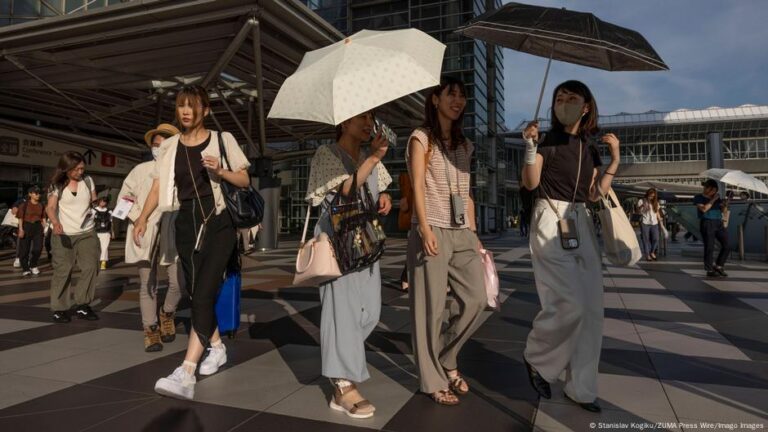In a nation that has long been synonymous with working hard and showing unswerving loyalty to an employer, more and more Japanese people are “quiet quitting” their jobs.
A term originally coined in the United States in 2022 for people who are disengaged and just do the bare minimum of work, “quiet quitting” has taken on a slightly different meaning in Japan — and one that would arguably make legions of toiling “salarymen” shudder.
A growing number of Japanese are choosing to clock in at work exactly on time and leave as soon as they can.
They are not looking for praise or promotion from their seniors. They are unbothered by the prospect of better pay if it means more work, while performance-related bonuses also fail to inspire them.
According to a study of 3,000 workers aged 20 to 59 conducted by the Mynavi Career Research Lab, a Tokyo-based employment research agency, some 45% say they are doing the bare minimum in their jobs. Significantly, employees in their 20s are most likely to admit to being “quiet quitters.”
The quest for more ‘me time’
There are many reasons why Japanese workers are no longer giving their all for their companies.
For 26-year-old Issei, the answer is straightforward: He wants more time to pursue the things he enjoys.
“I don’t hate my job and I know I have to work to pay my rent and bills, but I would much rather be meeting up with my friends, traveling or listening to live music,” said Issei, who asked that his family name not be provided.
“I know that my grandfather and even my parents’ generation thought they had no choice but to work hard and earn more money, but I do not understand that way of thinking,” he said.
“I think it is better to balance work and the things I want to do away from the office and I believe that most of my friends feel that way as well.”
The Mynavi study concluded that being able to have more “me time” was the primary motivation for most people who admitted to “quiet quitting.”
Others said they believed the amount of work they were putting in was appropriate for the pay they were receiving and that they were “satisfied” with their level of input and still gained a sense of accomplishment at work.
Others said they were doing the bare minimum to get by because they felt their contribution to the company was not appreciated or they had no interest in promotion or advancing their career.
“A lot of young people saw their parents sacrifice their lives to a company, putting in many, many hours of overtime and effectively giving up on their private life,” said Sumie Kawakami, a social sciences lecturer at Yamanashi Gakuin University and a certified career consultant. “They have figured out that is not what they want.”
“In the past, an employer would pay a fair wage and provide benefits so people stayed with the same company all the way until retirement,” she told DW.
“But that is no longer the case; companies are trying to cut costs, not all staff are on full contracts and pay while bonuses are not as generous as they were,” she added.
No longer giving it all for the company
“People see that and do not feel obliged to sacrifice themselves for the company,” she said.
Attitudes have also changed as a result of the restrictions imposed by the coronavirus pandemic, which prompted some to question their priorities. A new generation of young adultsstarted “finding it difficult to accept the concept of lifetime commitment to one company,” Kawakami said.
Izumi Tsuji, a professor of the sociology of culture at Tokyo’s Chuo University, said his experiences around young people have led him to the same conclusions.
“There is a huge change in the attitudes towards work among young people and my generation of people in their 50s,” he said.
“In the past, workers were extremely loyal to their employers, worked long hours, put in unpaid overtime and did not look to switch companies,” he said.
“In return, they and their families were provided for until they retired.”
Today, young people want to “concentrate on their hobbies, to be freer and to have a better work-life balance,” he said.
Tsuji sees the shift as a welcome change after decades of intense demands placed on workers by corporate Japan.
“It has to be a good thing,” Tsuji said.
“People were too loyal to their companies in the past and they had no life outside the office. Now, if they have lots more free time then maybe they will be spending more money and helping the economy or, even more importantly, meeting a partner and having a family. And that is important because the population is shrinking.”
Death by overwork
Kawakami adds another reason why “quiet quitting” marks a shift for the better for millions of Japanese employees.
“I welcome this change because older generations of workers would give 150% to their companies but the price they paid was ‘karoshi’,” she said, the Japanese term for death brought on by overwork.
In 1998, there were 32,863 suicides in Japan, with many linked to brutally long working hours and workplace pressure. The total figure for suicides remained above the 30,000 threshold for the next 14 years, but has been gradually declining since. In 2024, some 20,320 people died by their own hand, the second-lowest figure since 1978, when statistics were first compiled.
“Young people no longer feel that they have no choice but to stay in a job where they are not happy or to spend more time on themselves,” Kawakami said. “The result is happier people.”
Editor’s note: If you are suffering from serious emotional strain or suicidal thoughts, do not hesitate to seek professional help. You can find information on where to find such help, no matter where you live in the world, at this website: https://www.befrienders.org/
Edited by: Keith Walker


